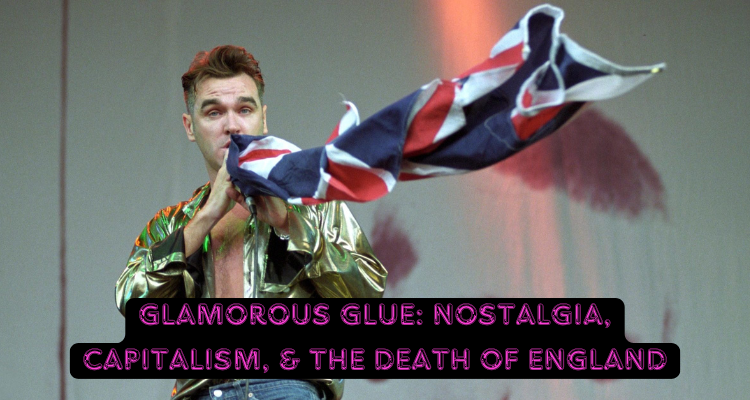If Margaret on the Guillotine was an explicit call for revolution, Glamorous Glue is something more philosophical, more existential, yet just as damning in its critique of modern Britain. While it might read like a lament for a dying England, it’s also a critique of capitalism, alienation, and the commodification of culture—a clear plea for something that, at its core, is communist-esque.
Everything of Worth Should Be Shared
Everything of worth
On Earth
Is there
To share
This is Morrissey’s most explicitly anti-capitalist statement. It cuts straight to the heart of class struggle—wealth and resources should not be hoarded, but shared. There is no metaphor here, no irony, no ambiguity. It’s a simple rejection of ownership, privatization, and inequality.
- It’s anti-individualism → The line dismisses the Thatcherite idea that “there’s no such thing as society.”
- It’s anti-elitism → If everything is to be shared, the very concept of class division is illegitimate.
- It’s anti-capitalist realism → Morrissey presents the most basic moral truth as if it should be obvious, but in doing so, exposes just how far modern Britain has drifted from it.
The Death of English Culture
From there, Morrissey moves into something even more damning—a diagnosis of cultural decay:
I used to dream, and I used to vow
I wouldn’t dream of it now
This isn’t just personal—it’s societal. Britain used to dream, used to aspire, used to imagine something better. But under capitalism—under the weight of image-driven consumer culture—those dreams have been replaced by cynicism, isolation, and empty spectacle.
We look to Los Angeles
For the language we use
London is dead, London is dead
This isn’t just about American cultural influence—it’s about the colonization of British identity by images, media, and fantasy. Real material culture has been replaced by its simulation—TV, Hollywood, advertising.
English culture isn’t dying from external attack—it’s dying from within. It no longer belongs to the people; it belongs to corporate interests, global capital, and media conglomerates.
Even language itself is being shaped by this takeover—not just in an aesthetic sense, but in a deeper, ideological sense. The way people speak, think, and even imagine their futures is dictated by American mass culture.
This ties into Žižekian ideology critique—how capitalist realism sustains itself by dictating what is even conceivable. If all dreams must be mediated through Hollywood, through commodity culture, then real political or social change becomes unimaginable.
Dwyer’s “Back to the Fifties” Nostalgia vs. Morrissey’s Nostalgia
As Michael Dwyer explores in Back to the Fifties, nostalgia is never really about returning to the past, but about constructing a fantasy of the past to serve present ideological needs. In postwar America and Britain, the 1950s were rebranded as an ideological safe haven—a mythical era of national strength, moral clarity, and cultural unity.
- Conservative nostalgia is performative—it sanitizes history, erasing its struggles to create a mythical “golden age” that serves modern reactionary politics.
- Cool Britannia nostalgia (in the 1990s) was a neoliberal branding exercise—it repackaged Britishness into something marketable and ironic, stripping it of any radical political potential.
- Morrissey’s nostalgia, however, isn’t about mythologizing the past in the same way—it’s about mourning a real material loss. He isn’t longing for empire or monarchy—he’s longing for a Britain that belonged to its people, before it was hollowed out by capital.
But here’s the problem: even if his nostalgia is rooted in class struggle, it still functions in a similar way to other ideological narratives.
He presents pre-Thatcher Britain as something pure, a place where working-class solidarity, cultural identity, and real social bonds still existed—but that past wasn’t untouched by ideology either.
- Was Britain ever truly unified? Or was it already fractured in ways Morrissey chooses to overlook?
- Was working-class solidarity ever free from the contradictions of capitalism? Or is this just another idealized construction of the past?
Is Glamorous Glue Also About Morrissey’s Own Nostalgia?
If the song critiques how Britain is held together by capitalist myth-making, it could also be subconsciously exposing how Morrissey’s own nostalgia operates the same way.
- He rejects the nationalist myth of Empire, but doesn’t he create his own myth of working-class England?
- If “glamorous glue” is the illusion that holds a broken nation together, isn’t his vision of a pre-Thatcher Britain also a kind of glamorous glue?
Morrissey might not intend for Glamorous Glue to critique his own nostalgic longing—but in doing so, the song highlights the danger of all nostalgia, even leftist nostalgia.
Morrissey’s Nostalgia as a Political Dead End
If nostalgia is always a fantasy that sustains ideology, then even progressive nostalgia can be limiting.
- If we only long for the past, we don’t imagine new structures beyond capitalism.
- If we only mourn what was lost, we risk trapping ourselves in a cycle of disillusionment instead of creating something new.
- If Britain was always dying, then what is there to reclaim?
This is why Glamorous Glue is so powerful—it’s not just critiquing capitalism—it’s mourning something that may have never existed in the first place.
Conclusion: Nostalgia and the Impossible
At its core, Morrissey’s nostalgia might be less about reclaiming a real Britain and more about mourning the impossibility of what Britain could have been. It’s a desire for something that never fully materialized, a longing for an alternative history that was never allowed to happen.



